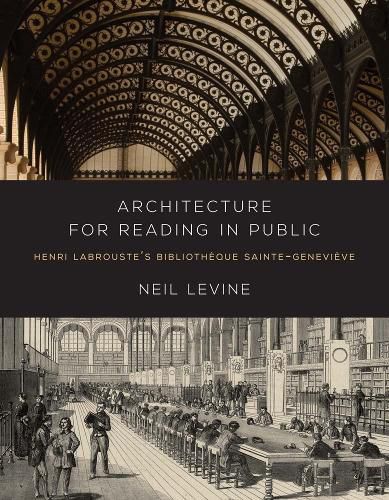Readings Newsletter
Become a Readings Member to make your shopping experience even easier.
Sign in or sign up for free!
You’re not far away from qualifying for FREE standard shipping within Australia
You’ve qualified for FREE standard shipping within Australia
The cart is loading…






An in-depth look at the iconic mid-nineteenth-century building and its construction during a period of revolution and its transformative impact on the history of architecture
Since its completion in 1850, the Bibliotheque Sainte-Genevieve has been heralded as a major forerunner of modern architecture. The architect Henri Labrouste, a product of the Ecole des Beaux-Arts, broke with the reigning neoclassical tradition by expressing on the exterior the building's internal functions and exposing on the interior the unprecedented iron construction of its reading room. Underlying these radical departures from tradition was a new democratic form of spatial organization appropriate to the new reading public.
Acclaimed architectural historian Neil Levine presents both a building history-discussing the significance of the program, site, prehistory, and building process-and a window into a period of momentous historical change by contextualizing Labrouste's work within the revolutionary times of the latter part of the July Monarchy and Second Republic in France. He examines how the building communicates a public purpose through its anticlassical, nonhierarchic, egalitarian form and reveals how the Bibliotheque Sainte-Genevieve is the product of a poetic architectural intelligence mixed with radical, democratic ideals.
$9.00 standard shipping within Australia
FREE standard shipping within Australia for orders over $100.00
Express & International shipping calculated at checkout
An in-depth look at the iconic mid-nineteenth-century building and its construction during a period of revolution and its transformative impact on the history of architecture
Since its completion in 1850, the Bibliotheque Sainte-Genevieve has been heralded as a major forerunner of modern architecture. The architect Henri Labrouste, a product of the Ecole des Beaux-Arts, broke with the reigning neoclassical tradition by expressing on the exterior the building's internal functions and exposing on the interior the unprecedented iron construction of its reading room. Underlying these radical departures from tradition was a new democratic form of spatial organization appropriate to the new reading public.
Acclaimed architectural historian Neil Levine presents both a building history-discussing the significance of the program, site, prehistory, and building process-and a window into a period of momentous historical change by contextualizing Labrouste's work within the revolutionary times of the latter part of the July Monarchy and Second Republic in France. He examines how the building communicates a public purpose through its anticlassical, nonhierarchic, egalitarian form and reveals how the Bibliotheque Sainte-Genevieve is the product of a poetic architectural intelligence mixed with radical, democratic ideals.